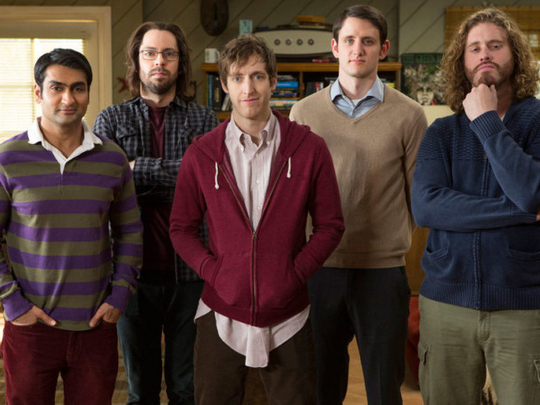
If Mike Judge’s new tech-world television comedy Silicon Valley were a start-up, Google Inc Executive Chairman Eric Schmidt might be an angel investor.
Schmidt appears briefly in the show’s opening scene, a start-up’s party where Kid Rock jams on stage and no one pays attention to the rock star. A newly minted tech millionaire tries to pump up the crowd shouting “I love Goolybib’s integrated multi-platform functionality. Yeah!”
“Eric Schmidt was not actually at the party that we shot: you have to make certain accommodations for multi, multi, multi billionaires,” said Alec Berg, Judge’s collaborator on the eight-episode show that debuts Sunday on US cable channel HBO. (Monday in the UAE on OSN First Comedy)
“So when we showed him the footage of that scene, he said, ‘I’ve been to that party,’ which was a huge boost for us because it felt like we got that right.” For Judge, it’s all about taking an “accurate, honest, satirical look” at the cradle of technology and innovation. He brings the biting, irreverent humour he honed in his MTV animated series Beavis and Butt-head and film Office Space to portray an industry few have dared to take on for television.
Judge himself worked as an engineer in Silicon Valley in the late eighties and he and Berg, a writer on Seinfeld and Curb Your Enthusiasm, immersed themselves in the current-day Valley vibe, visiting incubators and start-ups and hiring consultants.
They say they found no shortage of absurd material to bring life to the otherwise un-filmable realm of computer programming.
“It’s a world where someone could be worth a billion one day and nothing the next, or vice versa,” Judge said. “So there is a lot at stake and a lot of really interesting introverted, brilliant people.”
The main character Richard, played by newcomer Thomas Middleditch, is one of those brilliant introverts, who might be channelling an early version of Facebook founder Mark Zuckerberg.
He lives in the Hacker Hostel start-up incubator with four other programmers and has developed a powerful compression algorithm for his Pied Piper website.
Richard establishes his awkward but confident code-writing persona early on by calling late Apple founder Steve Jobs “a poseur” because “he didn’t even write code.” Richard finds himself in the middle of a bidding war for Pied Piper between two eccentric billionaires: the megalomaniac CEO Gavin Belson and the prickly venture capitalist Peter Gregory. Richard suffers panic attacks and seeks help from a doctor who instead pitches him with his start-up idea.
“You see the mounting pressure on his shoulders as he tries to get things done for deadlines,” said Middleditch.
A better place
Judge and Berg capitalise on what they call “the billionaire vibe,” which Judge says hasn’t changed all that much since his days in Silicon Valley.
To underline Peter Gregory’s eccentricity, Judge wanted him “to drive away in something really weird,” and ended up finding in the market an impossibly skinny car with no passenger side.
Belson often has a spiritual guru by his side and the common credo of making the world a better place becomes a central running joke in the show.
“We were looking at Tech Crunch videos and there are just sound bites with people saying they are making the world a better place,” said Judge.
They hired tech consultant Jonathan Dotan to be what they call their “full-time, in-house, go-to tech guy” and if he doesn’t know the answer, he’ll call the people who do.
“He brought us a Stanford grad student who is an expert on compression who built a mock-up of our actual Pied Piper,” said Berg. “It doesn’t actually do what it does on the TV show.”
Judge and Berg won’t reveal much about how Richard fares in season one, but Berg teases that “as Richard’s competence as a CEO grows, the level of the water rises just as much.” And if there is a season two, viewers should expect the show to take on two prominent themes these days in Silicon Valley: women in the tech industry and the growing class and income divide between the tech haves and have-nots.
“Hopefully, if we are lucky enough to make a season two, hopefully HBO is listening, then I feel like those are all things we would definitely take on,” said Berg.











